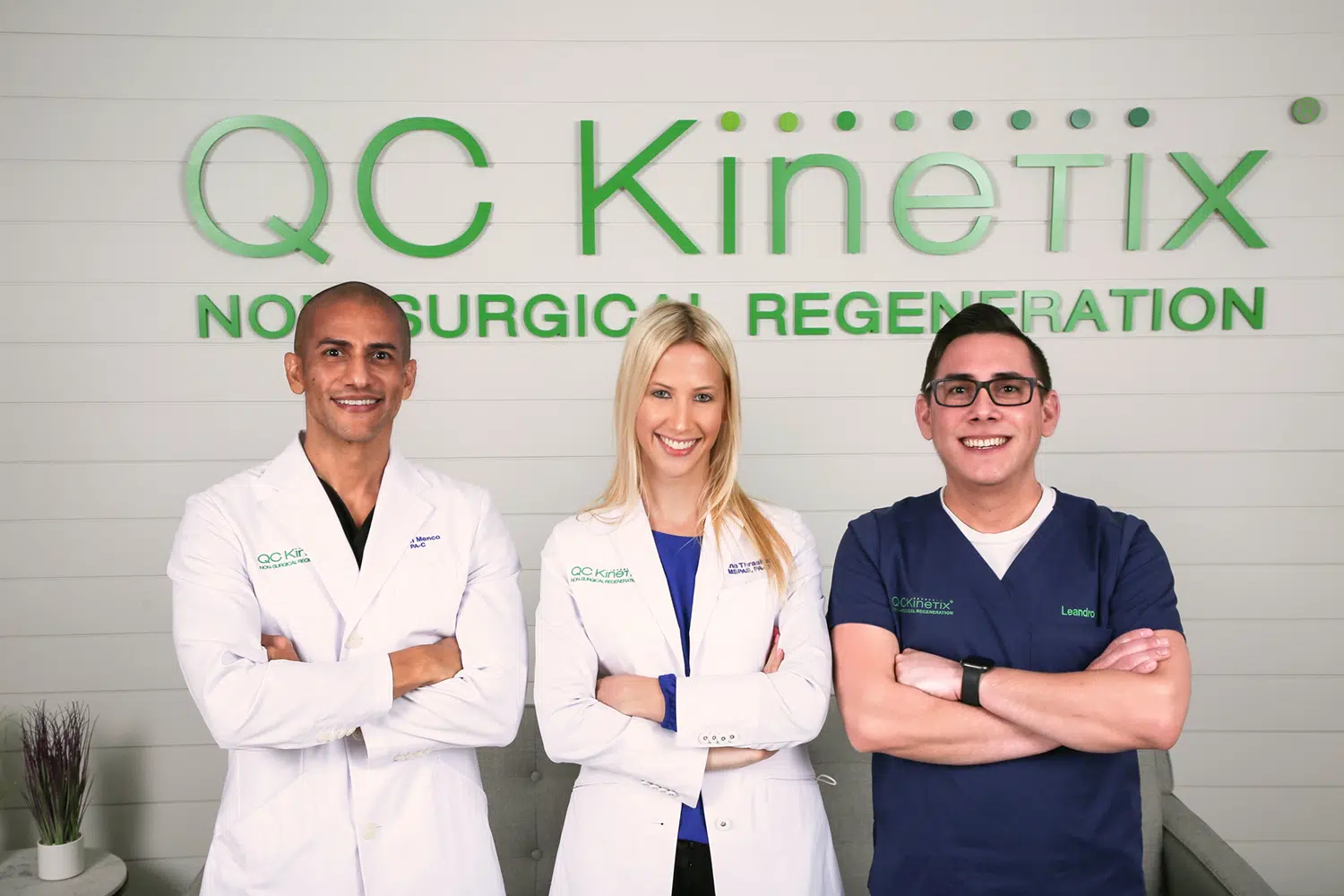Low Testosterone Treatment Options with QC Kinetix*
Conditions Treated > Low Testosterone Treatment
*This service is currently not available at all clinics.
Improve Your Quality of Life
While you might think low testosterone treatment (or “low T treatment”) is primarily used to aid sexual dysfunction or boost sex drive, its impact is much more far-reaching: Excessive fatigue, sleep disturbance, muscle weakness, and memory issues can all result from low testosterone levels.
If you’re experiencing any of these symptoms and want to explore natural low testosterone treatment options, QC Kinetix can help. Learn how our clients have benefitted from our regenerative treatments.

Understanding Low Testosterone Levels
Restoring balance with the help of low testosterone treatment is vital for maintaining overall health and well-being. QC Kinetix is dedicated to providing effective alternative treatment for low testosterone, offering natural solutions tailored to your needs.
Treatment for Low Testosterone in Young Males
While low testosterone is often associated with older age, in rare cases, men as young as 30 can also be affected and experience symptoms that can interfere with their daily lives. Identifying and addressing low testosterone in young males early on is crucial for their growth, physical development, and overall health. In this situation a referral to an endocrinologist may be best.
By employing regenerative medicine for natural low testosterone treatments, we aim to restore hormonal balance safely without the side effects commonly associated with traditional hormone replacement therapies. (To learn more about regenerative medicine, explore our FAQ section and our regenerative medicine blog.)
What Is a Dangerously Low Testosterone Level?
These dangerously low testosterone levels can reduce muscle mass and bone strength, intensify sexual health issues, and trigger numerous psychological symptoms, including depression, anxiety, loss of self-confidence, memory problems, difficulty concentrating, mood swings, and insomnia. To address these issues, QC Kinetix offers natural low testosterone treatment options. Our goal is to restore hormone balance and improve quality of life.
What Happens When a Man’s Testosterone Is Low?
Low T can also severely affect energy levels, making it harder to stay active and engaged in everyday life. It’s more than just an inconvenience; it’s a serious health concern that can diminish your quality of life. Our team at QC Kinetix is committed to providing effective natural options and alternative low testosterone treatments to help men regain their vitality and zest for life.
Long-Term Effects of Low Testosterone
At QC Kinetix, we specialize in providing natural low testosterone treatment options. Our goal is to not just manage the symptoms but to address the root cause, preventing these long-term effects and enhancing your quality of life.
QC Kinetix
Get Started with QC Kinetix
*Fill out the form below, and an expert will reach out to you shortly. All fields must be completed.
*Please allow 30-60 minutes of allotted time to meet with a specialist to determine if you are a candidate for our services. Exams are included and are complimentary.

Explore Low Testosterone Treatment with QC Kinetix
If you’re experiencing symptoms of low testosterone, contact your local QC Kinetix clinic today to find out about our non-surgical, drug-free low testosterone treatments. In the meantime, learn what to expect at QC Kinetix, and contact us with any questions.
We’re here to balance your hormone levels so you can live your best life. Schedule your free consultation today.
Low Testosterone Treatment*
People Also Ask (FAQs)
What happens if a man's testosterone is low?
Can you fix low testosterone naturally?
There are many steps that can support and potentially increase the body’s testosterone production:
- Maintain ideal body weight: Excess belly fat increases the activity of an enzyme called aromatase, which converts testosterone into estrogen. Every one-point drop in BMI can increase testosterone levels.
- Maintain a balanced diet: Avoid excessive sugar, caffeine, red meat, dairy products, food dyes, and processed foods. Include green tea, multicolored fruits and vegetables, nuts (particularly Brazil nuts), fiber (such as ground flax seed), and soy products in your diet.
- Avoid developing diabetes: Diabetes increases the risk of low testosterone levels. Proper management of blood sugar and overall health can help prevent this.
- Exercise regularly: Both aerobic exercises and resistance training can stimulate testosterone production. However, overtraining and calorie restriction can have the opposite effect.
- Ensure quality sleep: Most testosterone is produced during deep REM sleep. Disrupted sleep cycles can lead to decreased testosterone levels.
- Manage stress effectively: High cortisol levels can increase fat deposition and decrease testosterone levels.
- Avoid tobacco products: Tobacco use has been shown to reduce testosterone levels.
- Limit alcohol consumption: Consuming more than two drinks a day can increase the conversion of testosterone to estrogen.
- Avoid opioid pain medications: Opioids can decrease testosterone levels significantly, a side effect that should be reversible after stopping the medication.
At QC Kinetix, our natural low testosterone treatment programs include comprehensive plans that integrate these lifestyle modifications with regenerative treatments to improve testosterone levels naturally and effectively.
Is low testosterone therapy safe?
When managed within normal physiologic levels of testosterone, Low T therapy is extremely safe.
Can a man recover from low testosterone?
Recovery from low testosterone is possible for many men. Typically, symptomatic improvements occur within three to six weeks of starting regenerative low testosterone treatment. More significant changes, such as increased muscle mass, might require three to six months. However, each individual’s response may vary.
What triggers low testosterone?
Low testosterone in men can be attributed to a variety of factors. It may result naturally from aging or stem from medical conditions such as issues with the hypothalamus and pituitary glands, low thyroid function, or hypogonadism. Obesity is also a known trigger of low testosterone. In addition, certain medications, including those used for chemotherapy, can negatively affect testosterone levels, as can testicular injuries or cancer.

 1-800-490-4QCK
1-800-490-4QCK